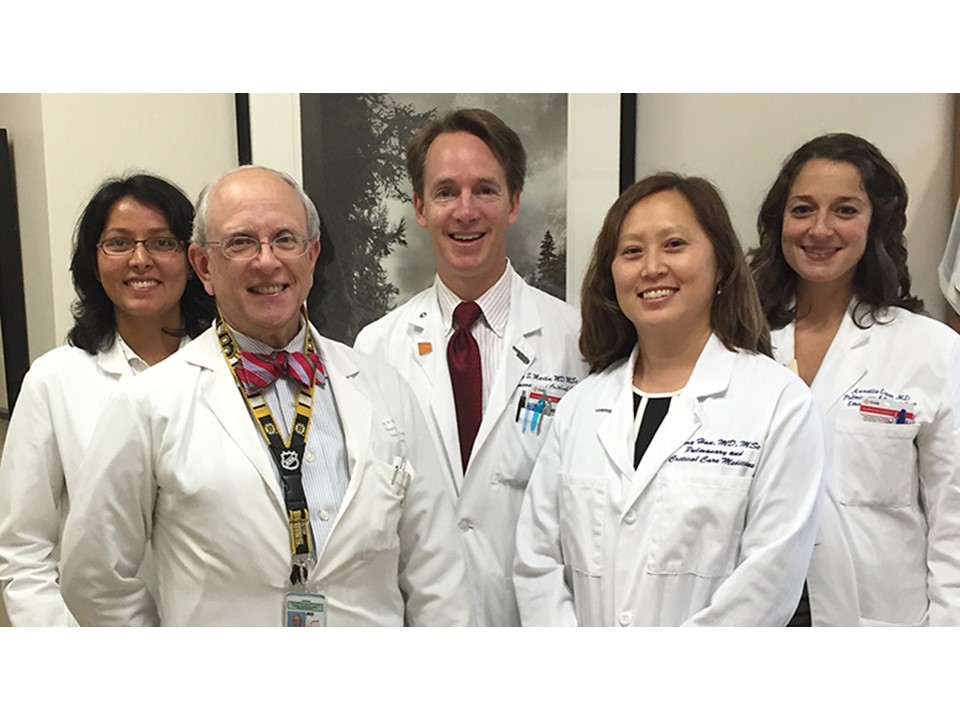Former Georgia CTSA Trainee Helps Lead ICU Response to COVID-19

"When faced with a rising number of COVID-19 patients under investigation and that have the disease in the Grady Memorial Hospital ICU, we had to quickly mobilize and have discussions with all of our critical care colleagues to determine how to redeploy intensivists. A critical care task force was assigned to this COVID-19 pandemic to evaluate the current status and where we needed to be to handle the surge of patients. We developed practice guidelines for the management of COVID patients and reviewed our inventory of critical equipment, such as ventilators and CRRT machines, to ensure that we were prepared to manage the potentially large number of critically ill patients. It really has been an amazing team effort with not only physicians but also nursing leadership, respiratory therapy and Grady leadership to get this operationalized," says Dr. Annette Esper. (pictured far right)
Annette Esper, MD, MSc, Associate Professor, Emory University School of Medicine, Division of Pulmonary and Critical Care Medicine, and Georgia Clinical & Translational Science Alliance (Georgia CTSA) Master in Science in Clinical Research (MSCR) graduate, is engaged with her team in Grady’s ICU in the ongoing battle against COVID-19. The team restructured their current intensive care units and deployment of those units. Since there are multiple ICUs at Grady, the team cohorted the COVID patients and designated a specific ICU a COVID ICU. They now have a tiered system in place that determines which ICU will become the next COVID ICU unit.
Operationalizing the cohorting of these patients is a key component to managing these critically ill COVID patients. "By cohorting these patients in one unit, physicians, nurses, and other ancillary staff can manage these patients more efficiently rather than going back and forth between non-COVID and COVID patients. Grady leadership was very helpful in working with us to initiate this process early and to move these patients into the specialized unit," comments Esper. "Also, by deploying our teams to a specific ICU, it decreases the number of people coming into that unit and the risk of contaminating other areas."
These teams are learning more each day about the disease. There is new information daily, so they have to be flexible and adjust. "All the physicians and the staff are willing to jump in and do what's needed to help each other and do what's best for the patients at Grady," remarks Esper. "Working with colleagues that have experience in other hospitals and institutions has been invaluable. Sharing their experiences, guidelines, data, and algorithms have helped us provide the best care at Grady. Everyone is learning from each other, sharing information and being available to help. It's the teamwork that's going to get us through this pandemic."
Esper and her team have responded to what needs to be done to clinically manage these patients, what opportunities there are to learn more about this disease, and how they can best communicate all of that information to society and to faculty and staff.
"Several tools I received in the Georgia CTSA MSCR program have helped me respond in this pandemic. I’m reviewing all this information, reading about it, hearing about it in the news, receiving data from other states and countries, and discussing it with colleagues. My MSCR training has enabled me to interpret the scientific data and follow the epidemiology of the disease," says Esper. "It has also prompted me to think about what questions are still unanswered about this disease. When this disease hit, I was initially focused on the clinical care and helping our team here operationalize what we needed to do from a critical care standpoint to be able to manage these patients. Now, I’m able to think about how we can make this an opportunity to learn more about this disease. As a clinician and a clinical investigator, it's invaluable to be able to work with other physician scientists and other MSCR graduates in infectious disease and other specialties, that are all interested in learning about this disease process. While we're managing these patients and taking care of them, we’re also taking the time to learn more about this disease through clinical trials, epidemiological studies and observational research."
"The MSCR program has been really helpful because I developed relationships with colleagues that are former graduates. I also learned how to mentor others doing research, and we’re now working together on potential studies. Having my MSCR degree has allowed me to obtain the skills needed to think about those important questions for future studies - to interpret the data that we have, think about what other data we need and how can we obtain that data," adds Esper.
The Emory Master of Science in Clinical Research (MSCR) degree program, in the Laney Graduate School at Emory University, provides innovative didactic and mentored research training to those interested in pursuing a career in clinical and/or translational research. The MSCR degree is designed for predoctoral, postdoctoral trainees, and junior faculty from Emory, Morehouse School of Medicine, Georgia Tech and UGA.
The Georgia CTSA is a statewide partnership between Emory, MSM, Georgia Tech, and UGA and is one of over 60 in a national consortium striving to improve the way biomedical research is conducted across the country. The consortium, funded through the National Center for Advancing Translational Sciences (NCATS) and the National Institutes of Health's Clinical and Translational Science Awards, shares a common vision to translate laboratory discoveries into treatments for patients, engage communities in clinical research efforts, and train the next generation of clinical investigators. For more information, visit GeorgiaCTSA.org.